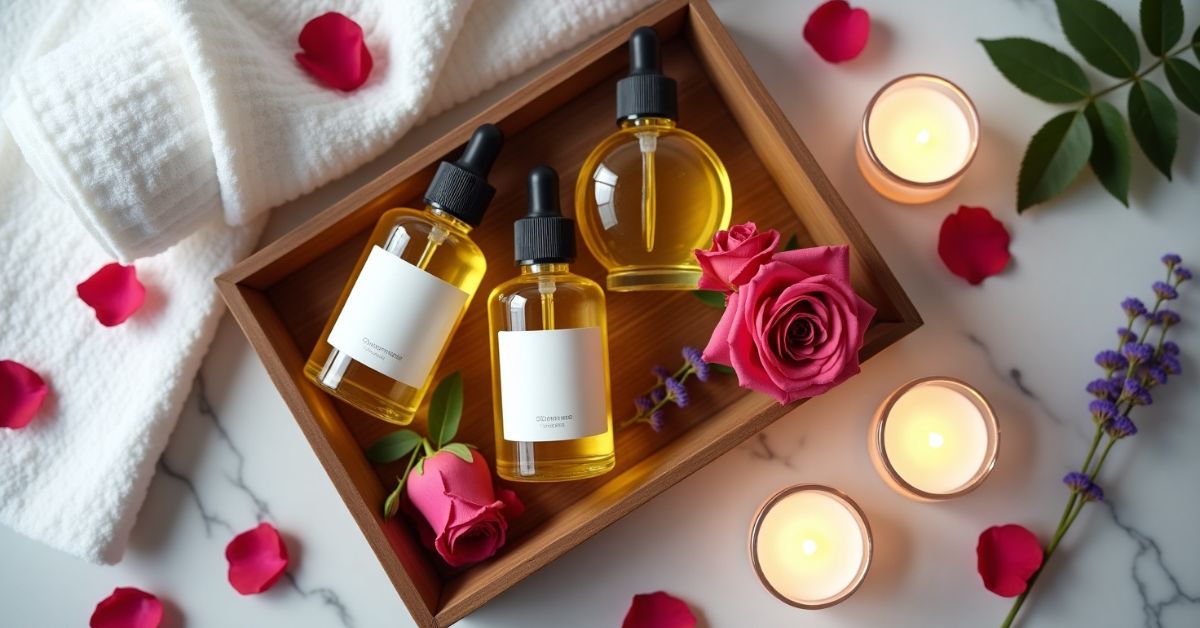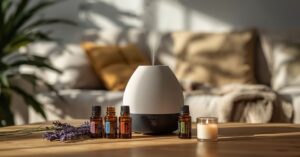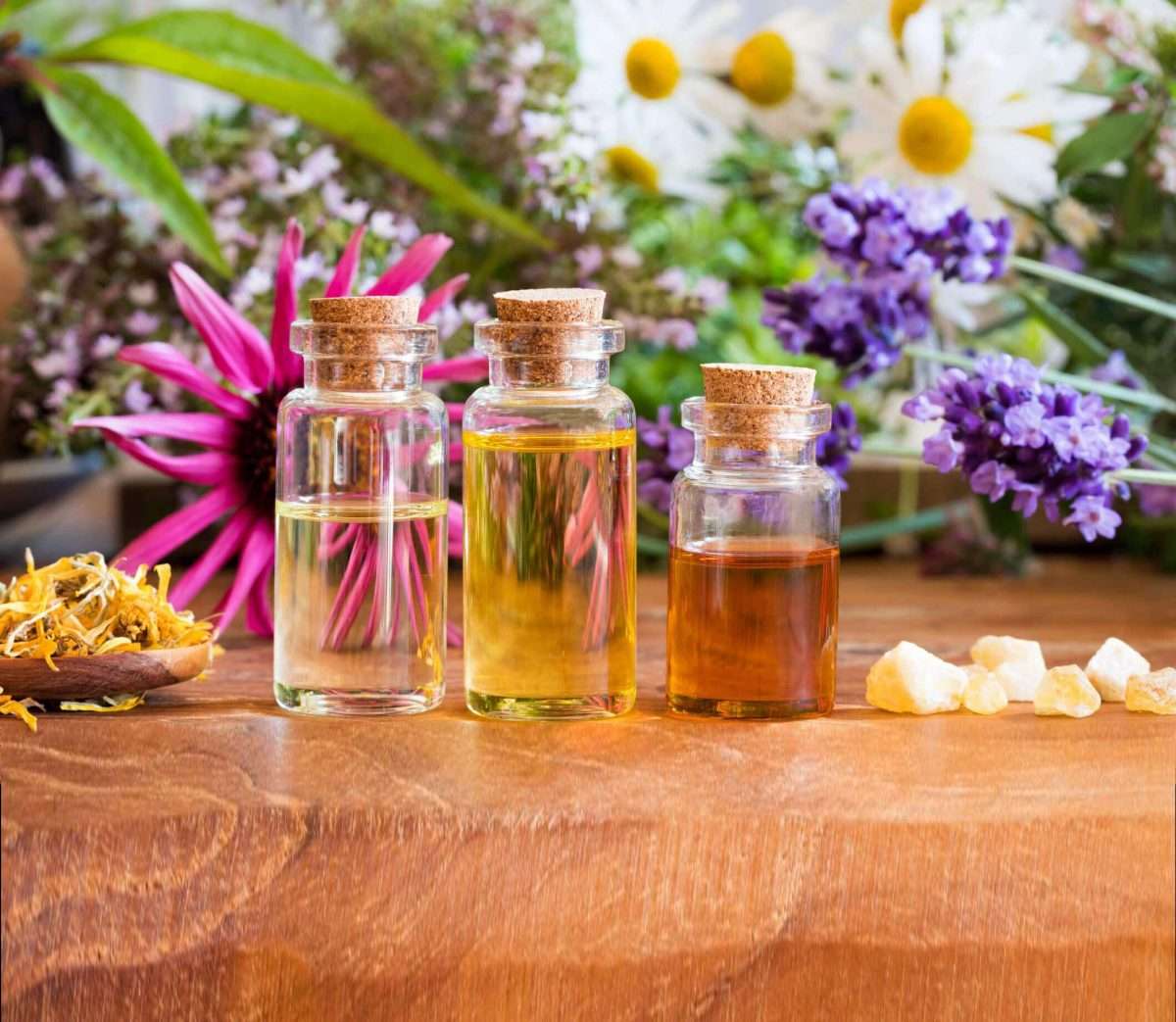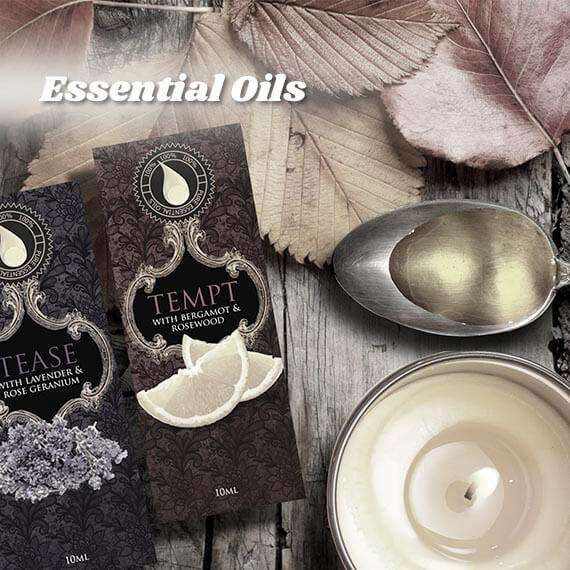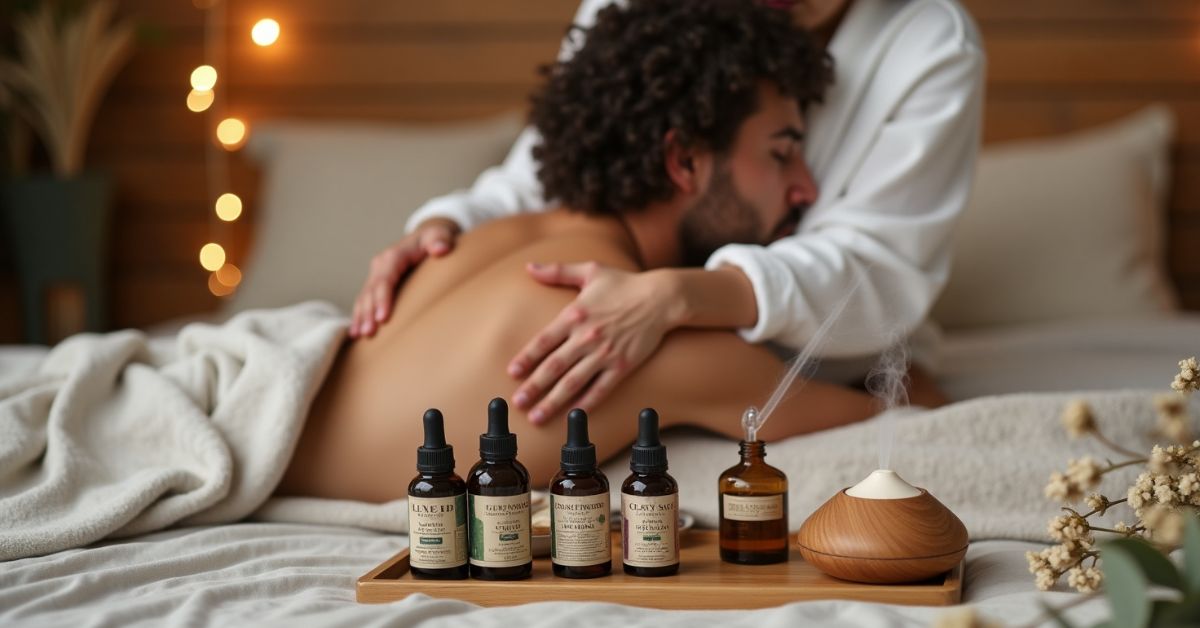
Do Aphrodisiac Oils Really Work? Scientific Evidence Revealed
Aphrodisiac oils have captivated human imagination for centuries, promising to unlock desire and enhance intimate experiences through the power of natural aromatics. From ancient Egyptian love potions to modern wellness routines, these fragrant elixirs continue to find their way into bedrooms and self-care rituals worldwide. But beyond the romantic allure and marketing promises, what does science actually tell us about their effectiveness?
The wellness industry has experienced unprecedented growth in natural intimacy products, with aphrodisiac essential oils leading the charge. Couples and individuals increasingly seek natural alternatives to enhance their intimate experiences, turning to botanical solutions that promise both pleasure and connection. This growing interest raises important questions: do aphrodisiac oils really work, or are their effects purely psychological?
This comprehensive exploration examines the scientific evidence behind aphrodisiac oils, investigating their mechanisms, effectiveness, and the research that supports—or challenges—their reputation as natural enhancers of desire and intimacy.
What Are Aphrodisiac Oils?
Aphrodisiac oils are concentrated plant extracts believed to stimulate desire, enhance mood, and promote intimate experiences. These essential oils derive their potency from volatile compounds found in flowers, roots, bark, and leaves of plants with historical associations to love and sensuality.
The term “aphrodisiac” originates from Aphrodite, the Greek goddess of love and beauty, reflecting humanity’s long-standing belief in nature’s power to influence romantic and sexual experiences. Unlike synthetic alternatives, aphrodisiac essential oils work through multiple pathways—aromatherapy, topical application, and psychological association—creating complex interactions between scent, emotion, and physical response.
Modern aphrodisiac oils are typically produced through steam distillation or cold-pressing methods, concentrating the plant’s active compounds into potent, aromatic liquids. These oils can be used alone or blended to create personalised fragrances that align with individual preferences and desired effects.
The appeal of natural aphrodisiac oils extends beyond their purported physical effects. Many users report feeling more confident, relaxed, and emotionally connected when incorporating these oils into their intimate routines, suggesting that their benefits may encompass both physiological and psychological dimensions.
Common Types of Aphrodisiac Essential Oils
Ylang-Ylang Oil
Ylang-ylang, derived from the Cananga odorata flower, stands among the most scientifically studied aphrodisiac oils. Native to Southeast Asia, this exotic bloom produces an oil with a sweet, floral fragrance that has been used in traditional medicine for centuries to promote relaxation and emotional balance.
Research suggests ylang-ylang oil may influence the nervous system, potentially reducing stress hormones that can inhibit sexual desire. Its chemical composition includes compounds like linalool and geranyl acetate, which demonstrate sedative and anxiolytic properties in laboratory studies.
Clary Sage Oil
Clary sage (Salvia sclarea) offers a more herbaceous approach to natural enhancement. This Mediterranean herb contains sclareol, a compound structurally similar to oestrogen, leading researchers to investigate its potential hormonal effects.
Studies indicate that clary sage may help balance hormones and reduce cortisol levels, potentially creating favourable conditions for intimacy. Its earthy, slightly floral scent is often described as grounding and emotionally stabilising.
Jasmine Oil
Jasmine oil, particularly from Jasminum grandiflorum, carries a rich history in perfumery and traditional medicine. Its intensely floral fragrance has been associated with romance across cultures, from Indian Ayurvedic practices to Middle Eastern traditions.
The oil contains compounds like benzyl acetate and linalool, which may influence mood and emotional states. Some research suggests jasmine’s aroma can stimulate the release of certain neurotransmitters associated with pleasure and well-being.
Sandalwood Oil
Sandalwood (Santalum album) provides a woody, warm base note that many find deeply calming and sensual. This precious oil has been valued in spiritual and intimate practices across Asian cultures for thousands of years.
Sandalwood contains alpha-santalol, a compound that may influence the limbic system—the brain region associated with emotions and memory. Its long-lasting fragrance and reported calming effects make it a popular choice for creating intimate atmospheres.
How Aphrodisiac Oils Are Believed to Work
Understanding how aphrodisiac oils might work requires examining the complex relationship between scent, brain chemistry, and human behaviour. The proposed mechanisms operate through several interconnected pathways.
Olfactory System Activation
The human olfactory system connects directly to the limbic brain, bypassing the conscious thought processes that filter other sensory experiences. When we inhale essential oil molecules, they bind to receptors in the nasal cavity, sending signals directly to areas of the brain associated with emotion, memory, and arousal.
This direct pathway explains why certain scents can trigger immediate emotional responses or vivid memories. In the context of aphrodisiac oils, specific aromatic compounds may stimulate brain regions involved in pleasure, relaxation, and emotional bonding.
Stress Reduction and Hormonal Balance
Many aphrodisiac oils demonstrate stress-reducing properties in scientific studies. Since chronic stress and elevated cortisol levels can significantly impact libido and sexual function, oils that promote relaxation may indirectly enhance intimate experiences.
Some essential oils appear to influence hormone production and regulation. Clary sage, for example, has shown potential in balancing oestrogen levels, while other oils may affect testosterone or other hormones involved in sexual desire and function.
Psychological and Emotional Effects
The power of scent to influence mood and emotion cannot be understated. Pleasant fragrances can reduce anxiety, increase confidence, and create positive associations with intimate experiences. This psychological component may be just as important as any direct physiological effects.
Research in environmental psychology shows that pleasant scents can improve mood, increase feelings of attractiveness, and enhance social bonding—all factors that contribute to intimate connection and desire.
Scientific Evidence: What Research Reveals
Clinical Studies on Aromatherapy and Mood
Several peer-reviewed studies have examined the effects of essential oils on mood, stress, and psychological well-being. A 2012 study published in the Journal of Alternative and Complementary Medicine found that ylang-ylang oil significantly reduced blood pressure and increased feelings of calmness in participants.
Research conducted at the University of Vienna demonstrated that certain floral scents, including jasmine, could increase alertness and positive mood states. While not specifically focused on aphrodisiac effects, these studies support the premise that aromatic compounds can influence psychological states relevant to intimacy.
Hormonal Research
Limited but intriguing research has explored the hormonal effects of certain essential oils. A 2017 study in the Journal of Phytotherapy Research found that clary sage oil inhalation reduced cortisol levels in postmenopausal women, suggesting potential benefits for stress-related sexual dysfunction.
However, researchers emphasise that most studies in this area are preliminary, with small sample sizes and limited duration. More comprehensive research is needed to establish definitive hormonal effects of aphrodisiac oils.
Neurological Studies
Brain imaging studies have begun to reveal how different scents affect neural activity. Research using functional magnetic resonance imaging (fMRI) shows that pleasant scents activate reward centres in the brain, potentially explaining the mood-enhancing effects of aromatic oils.
A study published in Chemical Senses found that certain floral fragrances activated brain regions associated with emotional processing and memory formation, providing a neurological basis for the psychological effects of aphrodisiac oils.
Limitations of Current Research
Despite growing interest, scientific research on aphrodisiac oils faces several challenges. Many studies focus on general aromatherapy effects rather than specific aphrodisiac properties. Sample sizes are often small, and research methodologies vary significantly between studies.
Additionally, the subjective nature of attraction and desire makes it difficult to design controlled studies that accurately measure aphrodisiac effects. Cultural, individual, and contextual factors all influence how people respond to aromatic stimuli.
Benefits of Aphrodisiac Oils for Couples
Enhanced Emotional Connection
Many couples report that incorporating aphrodisiac oils into their intimate routines helps create a more mindful, connected experience. The ritual of selecting and applying oils together can foster communication and emotional intimacy.
The shared sensory experience of pleasant fragrances may help couples feel more present and engaged with each other, potentially strengthening emotional bonds and enhancing overall relationship satisfaction.
Stress Reduction and Relaxation
Modern life’s pressures can significantly impact intimate relationships. Aphrodisiac oils that promote relaxation may help couples transition from daily stressors to intimate connection more effectively.
Research suggests that stress reduction is one of the most measurable benefits of aromatherapy, making this aspect of aphrodisiac oils particularly valuable for busy couples seeking to enhance their intimate experiences.
Sensory Enhancement
The multi-sensory nature of aphrodisiac oils can enrich intimate experiences by engaging the sense of smell alongside touch and other senses. This sensory layering may contribute to more memorable and satisfying encounters.
Some couples find that specific scents become associated with positive intimate experiences, creating a form of sensory conditioning that enhances future encounters.
Communication and Exploration
The process of selecting and experimenting with different aphrodisiac oils can encourage couples to communicate about their preferences, desires, and boundaries. This communication often extends beyond scent preferences to broader discussions about intimacy and connection.
Safety Considerations and Proper Usage
Dilution and Application Methods
Essential oils are highly concentrated and should never be applied directly to skin without proper dilution. Most aromatherapists recommend diluting essential oils in carrier oils like coconut, jojoba, or sweet almond oil at concentrations of 1-3% for topical application.
For aromatherapy purposes, oils can be diffused in the air using electronic diffusers, added to bath water, or applied to pulse points when properly diluted. Each method offers different benefits and safety profiles.
Potential Allergic Reactions
Some individuals may experience allergic reactions or skin sensitivities to certain essential oils. Patch testing is recommended before first use, particularly for topical applications. Common signs of sensitivity include redness, itching, or skin irritation.
Pregnant women, nursing mothers, and individuals with certain medical conditions should consult healthcare providers before using essential oils, as some compounds may not be appropriate for these populations.
Quality and Sourcing Considerations
The quality and purity of essential oils can vary significantly between manufacturers. Look for oils that are certified organic, steam-distilled or cold-pressed, and free from synthetic additives or adulterants.
Reputable suppliers provide detailed information about the oil’s botanical name, extraction method, and country of origin. This transparency helps ensure you’re purchasing authentic, high-quality products.
How Do Aphrodisiac Oils Enhance Intimacy?
Creating Atmospheric Ambiance
Aphrodisiac oils excel at transforming ordinary spaces into intimate sanctuaries. The psychological impact of pleasant, romantic scents can help couples transition from everyday mindsets to more intimate states of being. As you craft the perfect ambiance, consider incorporating one or more of these aphrodisiac oils for a heightened sensory experience:
- Ylang-ylang: known for its sweet, floral scent, ylang-ylang can help alleviate stress and promote relaxation.
- Jasmine: this exotic flower has a sensual and calming aroma that can enhance sexual desire.
- Patchouli: with its earthy and musky scent, patchouli is often used in perfumes to evoke feelings of passion and sensuality.
Stimulating Sensory Perception
Aphrodisiac oils have been used for centuries to stimulate the senses and increase arousal. These oils work by activating the olfactory receptors in our noses, which are directly connected to the limbic system in our brains – the area responsible for emotions and memories.
When we inhale these oils, their scents can trigger a physiological response that can lead to increased blood flow and heightened sensations. This not only helps with sexual desire but also creates an overall feeling of well-being and pleasure.
Enhancing Intimacy
Aside from stimulating the senses, aphrodisiac oils can also help create a more intimate atmosphere. The act of massaging each other with these oils can strengthen the bond between partners and increase feelings of closeness and connection.
Additionally, many aphrodisiac oils have therapeutic properties that can help relieve tension and fatigue, allowing both parties to feel more relaxed and open to intimacy.
Some oils, such as rose or jasmine, are known for their romantic and sensual scents. By using these oils during intimate moments, partners can create a more romantic and passionate atmosphere.
Improving Communication
Using aphrodisiac oils during intimate moments can also improve communication between partners. The act of massaging each other allows for nonverbal communication through touch, which can help build trust and increase emotional intimacy.
Additionally, the use of aromatherapy can stimulate certain parts of the brain that are responsible for emotions and mood regulation. This can lead to a more positive and relaxed state of mind, allowing partners to communicate more openly and effectively.
Incorporating aphrodisiac oils into your sexual routine can also be a fun and playful way to spice up the bedroom. Experimenting with different scents and seeing how they affect each other’s mood and desire can add excitement and novelty to the relationship.
Overall, using aphrodisiac oils during intimate moments can enhance both physical pleasure and emotional connection between partners. So next time you want to create a more romantic and passionate atmosphere, consider adding these sensual oils to your repertoire. So why not try incorporating some of these alluring scents into your next date night or romantic evening? You may be pleasantly surprised by the results! Just remember to always use high-quality, organic oils to ensure safety and effectiveness.
Experimenting with Sensual Oils
Adding aphrodisiac oils to your romantic routine can be a fun and exciting way to spice things up in the bedroom. But why stop there? These sensual oils can also be used in other aspects of your relationship, from date nights to daily life.
Here are a few ways you can experiment with aphrodisiac oils outside of intimate moments:
- Massage: Set the mood for relaxation and intimacy by giving each other massages using essential oils. Some popular choices for this activity include ylang-ylang, jasmine, and sandalwood.
- Perfume/Cologne: Create personalized scents for each other by mixing and matching different essential oils. Not only will this be a unique and romantic gesture, but the scents can also evoke feelings of desire and passion.
- Bath time: Add a few drops of your favorite aphrodisiac oil to your bath for an indulgent and sensual experience with your partner. Oils like rose, patchouli, and vanilla are perfect for enhancing relaxation and intimacy.
- Diffusing: Fill the air with a seductive aroma by diffusing aphrodisiac oils in your bedroom or living space. This is a subtle way to set the mood for a romantic evening or add some spice to everyday life.
- Cooking: Get creative in the kitchen by incorporating essential oils into your cooking. Certain oils like ylang ylang, cinnamon, and ginger are known for their aphrodisiac properties and can add a delicious twist to your meals.
- Massage: Create a sensual massage oil by mixing a few drops of an aphrodisiac oil with a carrier oil such as coconut or almond oil. This can be used for a romantic massage with your partner or as a self-care practice to reconnect with your own body.
- Perfume: Use aphrodisiac oils as natural perfumes to enhance your personal scent and attract potential partners. Oils like jasmine, neroli, and sandalwood have been used for centuries for their alluring aroma.
- Bath salts: Add a few drops of an aphrodisiac oil to your bath salts for a relaxing and sensual soak. Not only will the aroma awaken your senses, but the oils can also have therapeutic benefits for both the mind and body.
- Aromatherapy: Incorporate aphrodisiac oils into your daily aromatherapy routine by diffusing them in a room or using them in a personal inhaler. Choose oils that are known to stimulate desire and passion, such as ylang-ylang, rose, and clary sage.
- Candles: Create a romantic atmosphere by making your own candles infused with aphrodisiac oils. Simply add a few drops of oil to melted wax before pouring it into a container or mold. Not only will the scent enhance the mood, but the warm glow of the candlelight can also be incredibly sensual.
✅FAQs
Do aphrodisiac oils really enhance sexual desire?
Aphrodisiac oils work through a combination of psychological and physiological effects. Scientifically, some essential oils like ylang-ylang and clary sage have been shown to reduce stress and promote relaxation, which can indirectly boost libido. While direct effects on sexual desire vary by individual, many users report increased mood, intimacy, and arousal when using these oils.
How should I safely use aphrodisiac essential oils?
Essential oils are highly concentrated and should always be diluted with a carrier oil (like jojoba, almond, or coconut oil) before applying to the skin. Patch testing on a small skin area is recommended to check for allergic reactions. Avoid direct contact with sensitive areas and consult a healthcare provider if pregnant or nursing.
Which aphrodisiac oils are most popular and effective?
Popular aphrodisiac oils include ylang-ylang, jasmine, clary sage, sandalwood, and patchouli. Each has unique aromatic and therapeutic properties that promote relaxation, mood enhancement, and sensuality. Many couples find blends of these oils offer the best results for intimate experiences.
Can aphrodisiac oils be used during massage and as perfumes?
Yes! Aphrodisiac oils can be diluted with carrier oils for sensual massages to promote relaxation and intimacy. They can also be blended into natural perfumes or diffused in the air to create a romantic atmosphere. Just ensure you use skin-safe dilutions and avoid applying undiluted oils directly.
Are aphrodisiac oils safe for everyone?
While generally safe when used properly, some individuals may experience skin sensitivity or allergic reactions. People who are pregnant, nursing, or have certain medical conditions should consult their healthcare provider before use. Always follow recommended dilution guidelines and discontinue use if irritation occurs.

